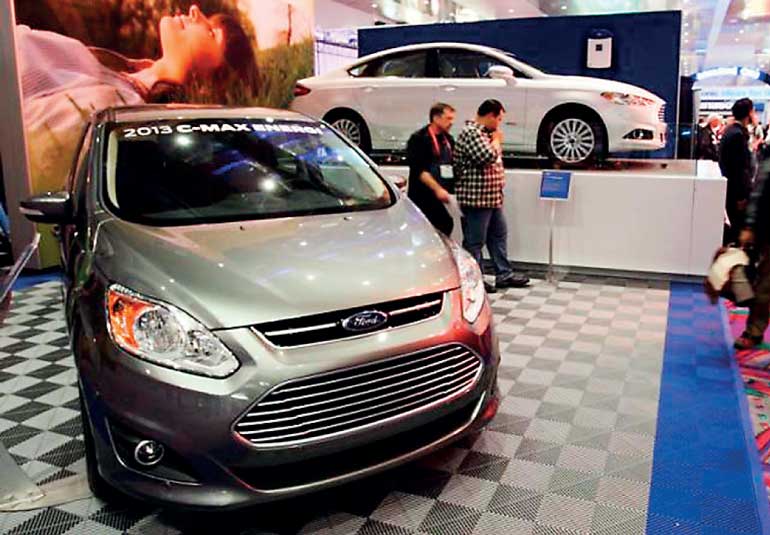Sunday Feb 22, 2026
Sunday Feb 22, 2026
Friday, 3 June 2016 00:00 - - {{hitsCtrl.values.hits}}
 The 2013 Ford C-Max Energi (L) and 2013 Ford Fusion Energi hybrids are displayed in the lobby of the Las Vegas Convention Center during the 2012 International Consumer Electronics Show (CES) in Las Vegas – REUTERS
The 2013 Ford C-Max Energi (L) and 2013 Ford Fusion Energi hybrids are displayed in the lobby of the Las Vegas Convention Center during the 2012 International Consumer Electronics Show (CES) in Las Vegas – REUTERS
Reuters: Automakers investing billions in plug-in cars and self-driving vehicle systems are getting caution signals from new research that suggests many mainstream consumers don’t know what benefits they would get.
A Harris Poll of 1,052 US residents found that 67% didn’t know anyone who owned an electric car, a plug-in hybrid or a hybrid.
The research by Harris, which has conducted surveys in the United States since 1963, was released Thursday and commissioned by Ford Motor Co. The Dearborn, Mich. automaker is investing $ 4.5 billion by 2020 to expand its lineup of plug-in hybrid, all-electric and hybrid models.
About 76% of those surveyed said they were ‘not at all sure’ how far a plug-in hybrid car could drive on a single refuelling and recharging. Plug-in hybrids run on electric power stored in batteries, and switch to a gasoline engine when the batteries run out of charge.
The average of the respondents’ guesses as to a plug-in hybrid’s driving range was 260.8 miles, less than half the actual range of most plug-in hybrids on the market. The poll found more affluent consumers and city dwellers were more familiar with electric and hybrid vehicles.
Separately, a survey released Thursday in Britain found that 55% of 2,002 respondents said they were unlikely to want to be a passenger in a driverless car. The poll was conducted by the Institution of Mechanical Engineers/ICM Unlimited.
A separate study by University of Michigan researcher Michael Sivak earlier this week found similar wariness of driverless vehicle technology among US residents.
Tesla Motors Inc, the Silicon Valley vehicle maker, said it received 373,000 net orders for its Model 3 sedan based on showing a prototype vehicle that won’t be available until late 2017.
Still, sales of plug-in, hybrid and electric vehicles in the US are less than 3% of the total market, according to industry sales figures. Mainstream automakers are under pressure to sell more plug-in vehicles to comply with greenhouse gas emission limits and state electric car sales mandates.
Ford plans to step up efforts to sell plug-in hybrids such as the 2017 Ford Fusion Energi, which the company says has a 610 mile range, by staging events to allow customers to drive them, and creating new digital marketing to explain what the technology does.
“The EV space is very fragmented,” Ford Fusion marketing manager Wade Jackson told Reuters, referring to confusion over the different attributes of hybrids, plug-in hybrids and electric vehicles. “Not a lot of manufacturers have come up with a clear understanding of what each means.”
Among other efforts, Ford is also promoting road trips that plug-in hybrid owners could do on a single tank of gas, plus a battery charge.
“You can drive from San Diego to San Francisco,” Jackson said.